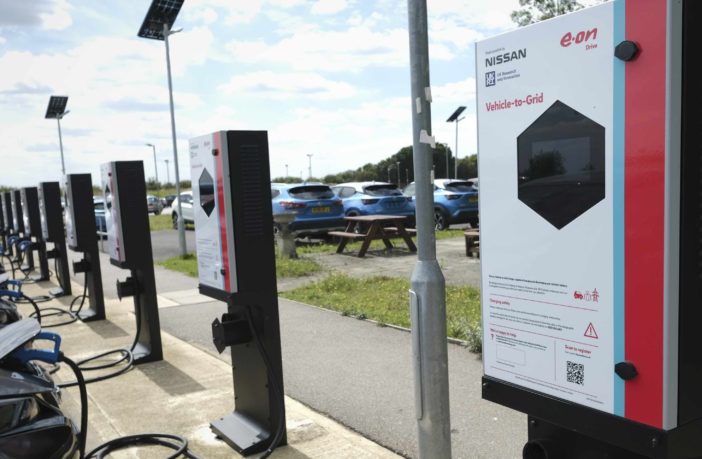Vehicle-to-grid (V2G) charging technology is set to play a vital role in supporting electricity grids handle the increasing number of electric vehicles. As a result, energy company E.ON and car maker Nissan have deployed 20 vehicle-to-grid (V2G) chargers in the UK as part of a trial to demonstrate how electric vans and cars can give back to the grid and help flatten peaks.
The install at Nissan’s European Technical Centre in Cranfield is the first in a large-scale V2G trial co-funded by Innovate UK. The project will test and demonstrate how storing and sharing electricity in fleet vehicles’ batteries can generate additional revenue for participating companies as well as supporting the power grid
Having validated the technology at Nissan’s Cranfield site, the project is now recruiting further participants for the trial and plans to deploy V2G chargers for organizations across the UK.
V2G technology allows electricity to flow in both directions to and from electric vehicle batteries, allowing energy stored in the battery to be sold back to the grid when demand for power is high. Vehicles can then charge when demand is lower or renewable generation is high, reducing reliance on fossil-fuelled generation, giving V2G a role in carbon reduction efforts.
The technology can also release capacity on the electricity networks which distribute power around the country. In collaboration with UK Power Networks, the trial will go on to explore opportunities for customers to earn revenues from this as a service.
Luke Ellis, V2G programme manager with E.ON UK, said: “Now that we’ve proven the technology’s capabilities with these 20 installs, we’re a step closer to bringing it to market. This is about commercializing a vehicle’s bi-directional charging capabilities, with clear advantages for businesses either already with a fleet of electric vehicles or those that are ready to make the transition to electric, and demonstrates how E.ON is providing solutions for customers that will help make the air cleaner.
“Operating an electric fleet means already contributing to the net-zero emissions target and saving money through local clean air zone exemptions; integrating your fleet with V2G technology brings greater cost savings and the chance to earn extra revenue. Fleet vehicles which sit idle overnight, or
even during the working day, could see their batteries charged when demand is low, with the energy exported when demand is high, but still be charged and ready for use when required.
“V2G technology brings with it wider environmental benefits for society as a whole. It can be considered ‘carbon negative’ for its potential to reduce or even remove the need for a fossil-fuelled generation to be fired up at times of peak electricity demand.”
Peter McDonald, fleet director at Nissan Motor GB, said: “We know many fleets are not just looking at electric vehicle acquisition, they are also reviewing their energy infrastructure for a world where electric vehicles are fast becoming the norm. Nissan is collaborating with E.ON on this exciting energy infrastructure project to expedite V2G technology in the UK. Thanks to the LEAF and e-NV200 being V2G-capable, these EVs are well set for the future.”
The V2G package for participants in the trial will be offered at a heavily subsidized price through grant funding made available through Innovate UK. Vehicles compatible with the technology being used in this project are currently the Nissan e-NV200 and the Nissan LEAF2.
As well as E.ON and Nissan the V2G project consortium (known as e4Future) includes Newcastle University, Imperial College London, Northern Powergrid, UK Power Networks and National Grid ESO. The V2G platform used on the trial utilizes a combination of E.ON’s existing Virtual Power Plant software as well as a charger operating system provided by E.ON’s e-mobility partner Virta.
The project is part of the V2G program, funded by the Department for Business, Energy and Industrial Strategy and the Office for Low Emission Vehicles (OLEV), in partnership with Innovate UK. Part of UK Research and Innovation (UKRI), Innovate UK is the UK’s innovation agency investing in science and research.
Source: https://www.electrichybridvehicletechnology.com
CUT COTS OF THE FLEET WITH OUR AUDIT PROGRAM
The audit is a key tool to know the overall status and provide the analysis, the assessment, the advice, the suggestions and the actions to take in order to cut costs and increase the efficiency and efficacy of the fleet. We propose the following fleet management audit.




